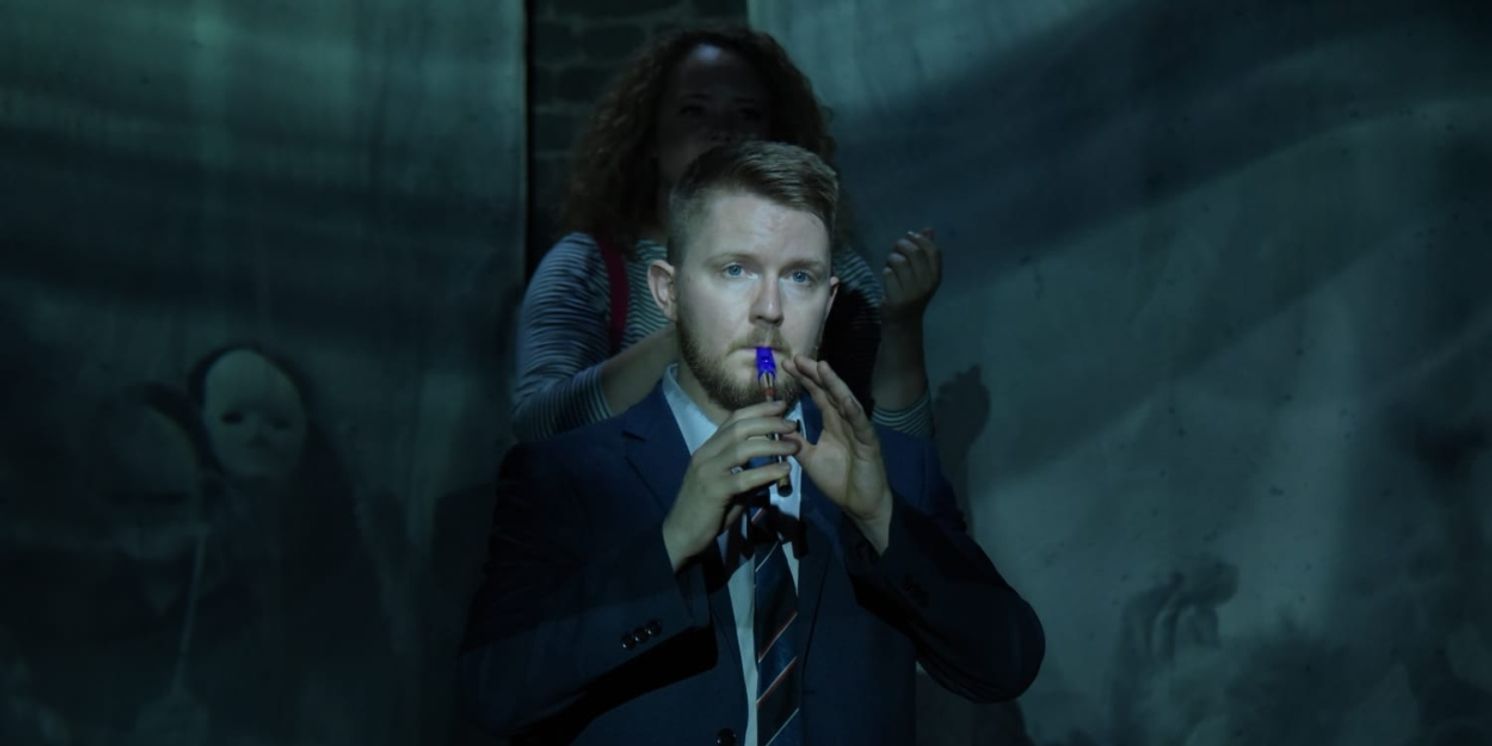Review: THE MAGIC FLUTE, Arcola Theatre
A fresh take on the Mozart classic as part of the Grimeborn festival.

![]() The stated goal of an opera festival such as the Arcola's Grimeborn is to put a new spin on the classics in order to introduce them to new audiences, and in this respect The Magic Flute seems to pose more adaptational challenges than most.
The stated goal of an opera festival such as the Arcola's Grimeborn is to put a new spin on the classics in order to introduce them to new audiences, and in this respect The Magic Flute seems to pose more adaptational challenges than most.
Mozart's elaborately plotted Singspiel concerning Prince Tamino's fish-out-of-water immersion in a fantasy land of seductive Egyptian cults, demons, and vengeful queens resists straightforward transferral to a modern setting, but this is what Opera Alegría has attempted.
Tamino (sung emotively by Peter Martin) is now a financial services worker who has somehow found himself in a theatre, caught between the machinations of eccentric director Sarastro (Alistair Sutherland) and the Queen of the Night (Fae Evelyn), now an ageing diva.
This setting lends itself to some fun metatheatrical touches (the dialogue of Papageno the birdcatcher-turned-theatre technician who "only came to do the lights", played with subtle comic timing by René Bloice-Sanders, is a particular highlight for this), but on the whole the production never fully commits to adapting Mozart's plot to a modern context.
Certain plot elements, such as the source of the tension between Sarastro and the Queen of the Night or how Sarastro's cult have managed so quickly to seduce Tamino and his love interest Pamina, can plausibly remain mysterious in the original fantasy setting, but feel incongruous when left unexplained in an otherwise ordinary modern workplace.
Nonetheless, in specific episodes, the libretto (newly translated by Lindsay Bramley) is inventive in its fresh interpretations of the source material. While some jokes fall flat (a reference to the "your next job could be in cyber" campaign feels particularly tired), most of the time Bramley manages to breathe new life into certain sections of the opera whose satirical flavour is sometimes overlooked. Sarastro's scenes with his cult of trainee priests, for example, are memorably transformed into takedowns of the particular breed of theatre professional who is likely to humiliate a newcomer for not having read enough critical theory.
Elsewhere, there is a pleasing LGBTQ+ twist in Papageno's plotline, which feels fresh while also drawing our attention to the themes of self-revelation through romantic love present in the original.
The Magic Flute is often referred to - either with praise or derision - as a wonderfully silly beginners' guide to opera, and Opera Alegría embraces this in respect to its' production values. The makeshift aesthetic of the props, which include a Lunar New Year-esque dragon puppet relentlessly pursuing Tamino in the opening scene and flapping wads of sheet music depicting Papageno's 'birds', seems a perfect fit for the playfulness of Mozart's score (ably accompanied in this production by a solo pianist).
Bramley's translation leans in to the original libretto's more ridiculous moments, and the cast, especially Bloice-Sanders and the Three Ladies (now theatre cleaning staff played by Caroline Carragher, Anna Prowse, and Frances Stafford), play its most hyperbolic moments with a knowing deadpan.
Where this new translation fails, though, may be in its more profound moments. The original's philosophical undertones are a complex blend of Masonic references, religious influences, and the Enlightenment-era pursuit of spiritual emancipation and self-improvement. Rather than attempt to adapt any of those themes, this production clumsily attempts revelation about the value of art. The result is a vague conclusion surrounding how everyone (even Tamino) can find their place in the theatre and how art can set one free, which feels especially unearned given the abruptness and unexplained nature of Tamino and Pamina's conversion to Sarastro's dramatic cult.
While the theatrical setting is an inventive choice, its implications for the wider themes of The Magic Flute are not always followed through.
Though an imperfect adaptation, Opera Alegría is nonetheless memorable, and functions as a fine introduction into how Mozart's operas can be by turns silly, satirical and somewhat philosophical, and is thus is an enjoyable and accessible way into the classic 'beginners' opera'.
The Magic Flute is at the Arcola Theatre until 20 August
Photo credit : Zak Kilby
Reader Reviews
Videos

